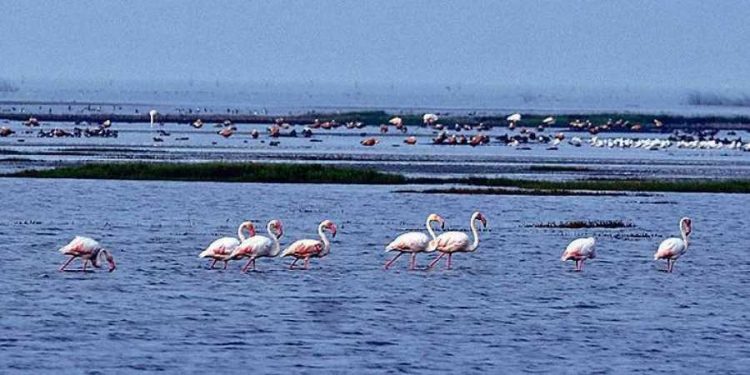The number of avian species visiting Kanjia Lake has come down from 2,514 of 29 species in 2018 to 2,468 birds of 28 species this year
Bhubaneswar: According to this year’s bird census conducted at Kanjia Lake at Nandankanan Zoological Park (NZP) here and Kolab reservoir in Koraput district, Odisha hosted less number of winged guests this winter.
The census indicated that the number of avian species visiting the Kanjia Lake has come down from 2,514 of 29 species in 2018 to 2,468 birds of 28 species this year. Migratory birds like Indian Skimmer skipped the water body, while eight new species picked it for their winter sojourn.
Assistant conservator of forests (ACFs) Anjan Kumar Mahanta and Amulya Kumar Parida, Range Officer Sameer Sahu, Ashok Das, Kamal Lochan Purohit and students of six educational institutions, including SOA, OUAT and CUO, were engaged in the bird counting exercise.
The census was conducted at Kanjia Lake, Kiakhani, Masanipada and Nali Padia Khadan near the NZP.
The bird count at Kolab reservoir saw a similar trend. “Apart from four new species, around 919 migratory birds visited the reservoir this year, which is quite less as compared to the previous year,” said Koraput forest department official Subash Khuntia.
The bird census was carried out from Kolabnagar to Ganjaipadar at Kolab reservoir.
According to sources, over 25 special camps have been set up for counting of migratory birds.
Meanwhile, bird counting is underway in Chilika Lake. Bhitarkanika National Park in Kendrapara district will remain out of bounds to visitors from January 6 to 14 during the census of estuarine crocodiles and migratory birds.
The headcount of crocodiles will be done at Mahanadi, Bhitarakanika, Ghodahada and Similipal river systems.
Similarly, the dolphin census will be conducted January 19.
Last year’s census had shown huge drop in the migratory birds at Chilika Lake. It showed the number of migratory birds visiting the lake dropped by 53,000 as compared to the previous year (2017).
Last year’s census put the count at 8,93,390 birds of 147 different species. In 2017, it was 947,119 birds of 167 different species.






































